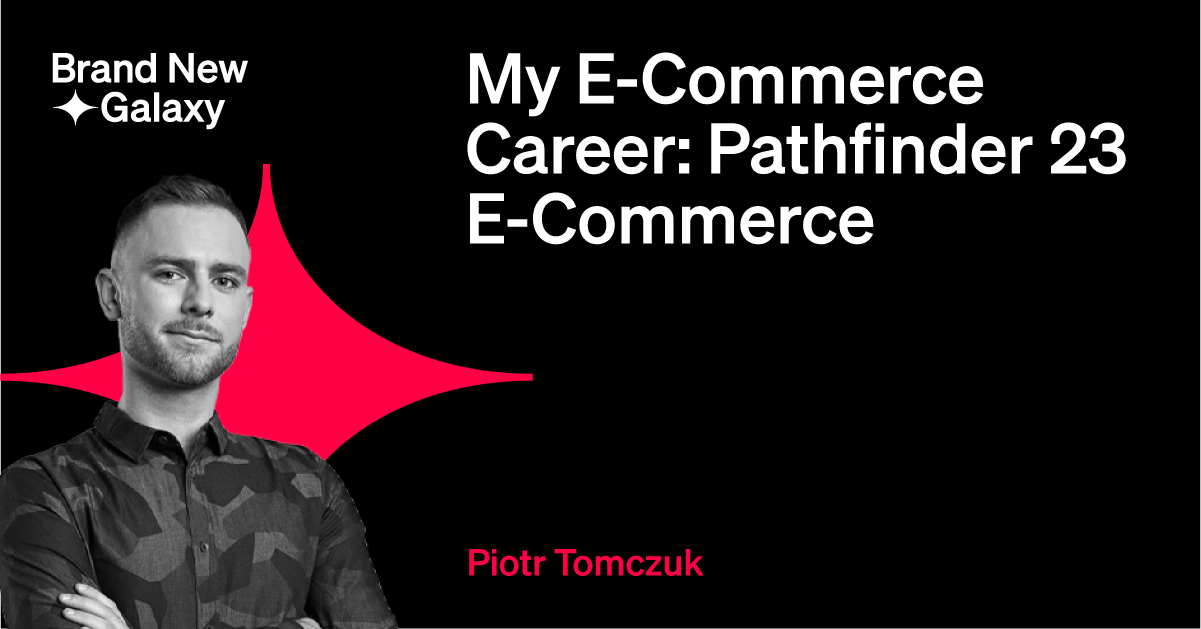My E-Commerce Career: Pathfinder 23 E-Commerce Strategy Director Piotr Tomczuk

Careers in e-commerce are as dynamic and varied as the fast-changing industry itself. Below, in his own words, Pathfinder 23 E-Commerce Strategy Director Piotr Tomczuk shares his path to e-commerce success, as well as his expert advice to those considering a similar—and similarly exciting—career path.
To be honest, I didn’t plan a career in e-commerce. When I started studying finance and accounting, I thought I would be a stockbroker like my mother, who was one of the first women in Poland with a stockbroker license. But when I realized that finance wouldn’t hold my interest in the long run, I explored other areas of study. I quite like to stick with my decisions once I have made them!
As I explored psychology for business and a specialization in human-computer interaction design, I found inspiration in topics such as consumer psychology, user experience, service design, and creative coding, where I learned I could make fruits make sounds with a bit of hardware and a simple code. I certainly didn’t become an expert in those fields, but broadening my professional perspective helped prepare me for my eventual career, and made me more appealing to potential employers, I’m sure.
After my studies, I knew I wanted to choose a future-proof career path—something that I could stick to long-term, certainly, but I also wanted to enter an industry that was still growing, to be a part of its development, or maybe even contribute to it by creating new solutions and ways of working. There is a strong entrepreneurial spirit in my family, and I want to nurture that spirit by constantly creating value. E-commerce checked all those boxes.
When I say that e-commerce is future-proof, I mean that it will remain an exciting, motivating, and rapidly changing industry for many years. Since I joined the industry, its landscape has changed tremendously in terms of channels’ capabilities, market solutions, and the variety of competencies that are welcomed. The best thing, though, is that the evolution goes on and on.
For more than a decade, at every conference and in every industry report, we’ve heard that “e-commerce is booming,” but from my perspective, e-commerce was still in its infancy just a couple of years ago. It was quite technical, and the biggest challenge was understanding the limitations and requirements of the e-commerce world. Brands wanted to have something live online on e-retailers’ websites, and agencies who knew how to make that happen were very successful.
Those technical e-commerce capabilities have become more common in recent years, and now brands are much more focused on moving beyond the basics and building a unique e-commerce experience for shoppers. It is no longer just about a good price, decent service, and quick delivery, but about innovation, engagement, and a great shopping experience that is consistent across all channels online and offline.
This new focus drives the evolution of e-commerce in multiple directions. For example, I think there will be an increasingly strong demand for creative competencies as brands try to increase their communication efforts in e-commerce. But one of the beautiful things about e-commerce is that it fits a great variety of profiles and skill sets because e-commerce is present on all the steps of the consumer journey.
If you have significant experience in other areas of marketing, to succeed in e-commerce you’ll probably need to be flexible—be open to learning new things and adjust your mindset to fit an e-commerce environment. E-commerce is, by its nature, a more dynamic channel that requires that you focus on sales the entire time. It also allows you to build brand awareness and increase reach—after all, there are brands born in e-commerce—but linking these brand-building activities to conversion and sales is critical. In the e-commerce agency world, no client will praise you for just scoring “likes.” If you make your product highly visible but that does not translate into sales, that means that you did something wrong on the conversion side, so you must take a holistic perspective.
If you are just starting out, remember that logical thinking and common sense are some of the most powerful skills in e-commerce. From my point of view, some areas of traditional marketing are not logical. Something might work, but it is sometimes hard to tell why exactly it works. In e-commerce, if you think logically and connect the dots, many things start to seem obvious. If, for example, you visit an e-retail website, put yourself in a consumer’s shoes, and try to look through that lens, it is often relatively easy to recreate the path to purchase, identify any points of friction, and come up with solutions to ease the process and ultimately increase sales.
E-commerce is a great career entry point, but if you are mid-career and want to switch your career path, there is a great chance you can leverage your current experience into e-commerce.
On one hand, e-commerce is a communication channel that plays a big role in inspiring consumers and building brand awareness, so a background in communication, creative, or media might come in handy. On the other hand, the goal of e-commerce is obviously to close the deal, so a UX background will help you build a better experience on path-to-purchase, and trade experience will help you optimize assortment. The list goes on and on.
It’s important to note that e-commerce careers paths in the U.S. and Europe currently look quite different. In part, this is because the U.S. has a very focused e-commerce market: there are a few platforms such as Amazon, Walmart, and eBay that represent the majority of the market, which leads to specialization in those platforms. In the U.S. there are dozens of agencies that focus entirely on Amazon, which is not the case in Europe, where you need to learn how to play on diverse e-commerce platforms. Another reason is the maturity of the markets—the U.S. is a few years ahead of Europe so there are likely just more e-commerce professionals on the market, but I believe that should balance in upcoming years.
Every day, the broad perspective that I got from my studies and have nurtured ever since proves useful. As an e-commerce strategy director, I am responsible for a strategy department composed of brand experience strategists, analysts, strategy planners, or SEO specialists—to a great extent, we are defining and developing agency services. I can observe market and consumer trends, choose the right growth direction for the agency, and lead the development of new services. I can also communicate well with a diverse team because I understand what they are doing and can clearly convey my expectations so we can efficiently tackle challenges. That part may seem obvious, but it can be very tricky! A broad perspective gives you the ability to connect many dots, which makes all this possible.
Another important area of my work is cooperation with business leaders, with whom I work to shape growth strategy for our clients and create compelling storytelling behind the services we are pitching them. My finance background helps me speak that language, but my strategic perspective brings the biggest value to the table, and all my skills work together to meet the daily challenges and opportunities of e-commerce. Whatever experience you have in your background, there is a place for you in this exciting profession.
by: Gemma Wilson
This interview is part of a blog series highlighting the extensive e-commerce expertise and thought leadership throughout Brand New Galaxy – provided by content26.
Contact for media
We work with global and local media closely. In case of questions or proposals, contact us.


